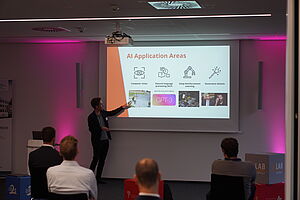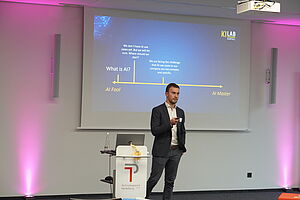The Dinner Talk of the KI-Lab Kurpfalz took place on October 2nd at the Business Development Center Heidelberg as the first event since mid-March to be held in person only. Representatives of regional companies were invited to learn more about trends in the field of artificial intelligence and to exchange views on future areas of application.
Speaker Alexander Fred-Ojala explained to the audience how data-driven companies, such as Facebook or Amazon, are among the most successful nowadays. While just a few years ago, industries such as the oil or chemical industry generated the most successful companies, these now come almost without exception from the digital sector. This speaks volumes for the relevance of business models based on artificial intelligence and the use of data.
Alexander Fred-Ojala himself is AI Director at UC Berkley and founder of Predli, an AI consulting firm. From 2018 to 2019 he received the "AI Fellowship" from Amazon. He also spoke about the application areas of artificial intelligence. Computer Vision¹ and Natural Language Processing (NLP)² are already well advanced, while applications in the field of Deep Reinforcement Learning³ and generative models⁴ are still less commercialized. A short discussion and question round and the following get-together with food and wine concluded the event.
About the KI-Lab Kurpfalz:
On 27th December 2019, the Baden-Württemberg Ministry of Economic Affairs, Employment and Housing announced that it will provide 2.3 million euros in funding for the use of artificial intelligence (AI) in medium-sized companies through the establishment of regional AI labs. The KI-Lab Kurpfalz is one of 19 regional AI labs that are supported as part of the "Action Program AI for Medium-Sized Businesses" of the state government. The aim of the joint initiative of the Heidelberg Technology Park and bwcon GmbH is to provide small and medium-sized enterprises (SMEs) with low-threshold access to the future technology AI.
The offers and further training programmes of the KI-Lab Kurpfalz can help SMEs to develop the necessary key competences of AI - where they are needed. Data collection, evaluation, analysis and subsequent use require experience and special instruments - the Heidelberg Technology Park will provide these in the form of methods, materials and data in cooperation with bwcon GmbH. This also includes data from the Data X Lab at the University of California, Berkeley.
1: Computer Vision attempts to process and analyze images captured by cameras to understand their content or extract information.
2: Natural Language Processing (NLP) is a process for automatic analysis and representation of human language. NLP attempts to capture natural language and process it computer-based using rules and algorithms.
3: Deep Reinforcement Learning is a method of machine learning in which an agent independently learns a strategy to maximize rewards received.
4: A generative model in the field of 'Machine Learning' describes a model that generates something specific, for example an image.


